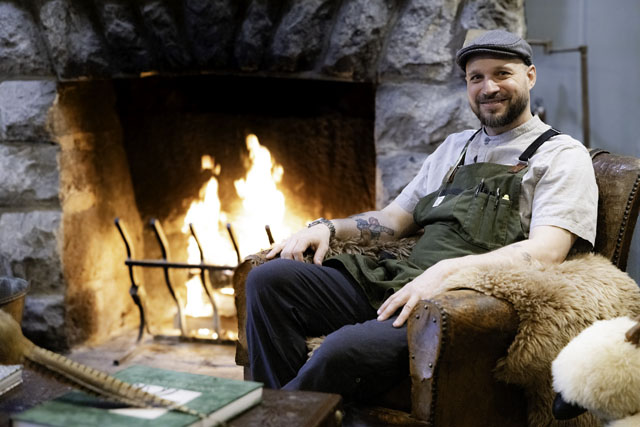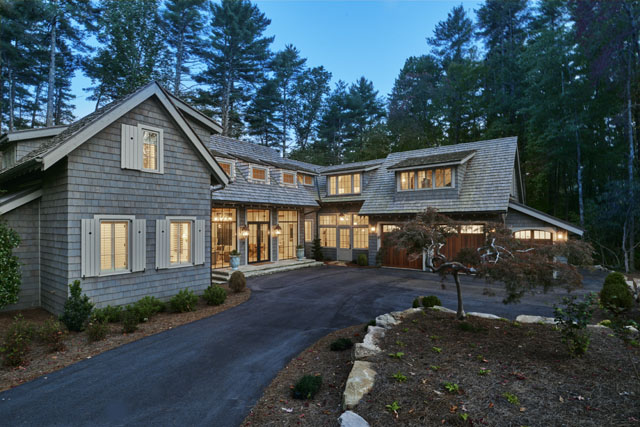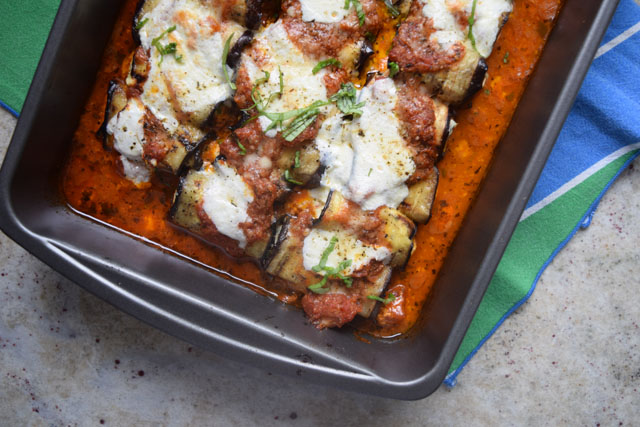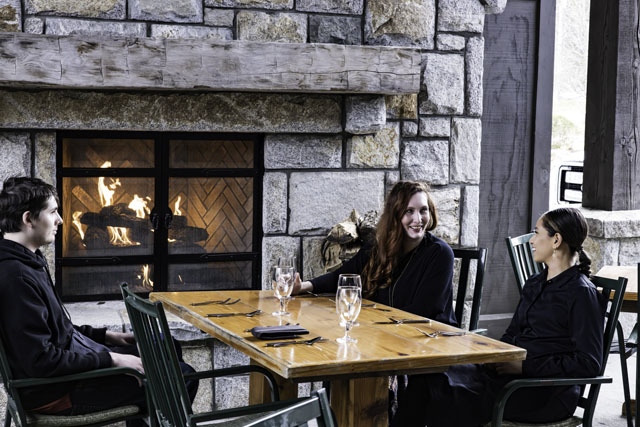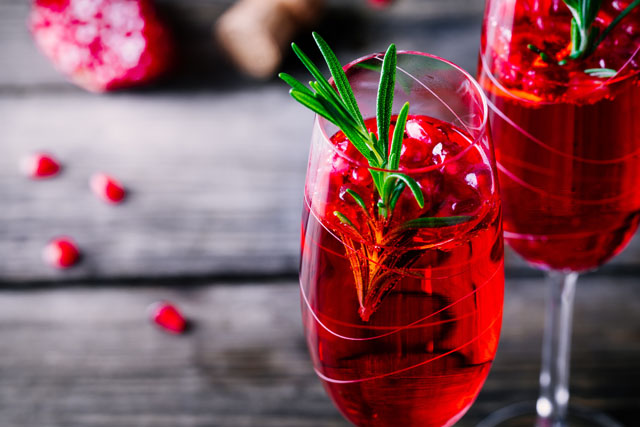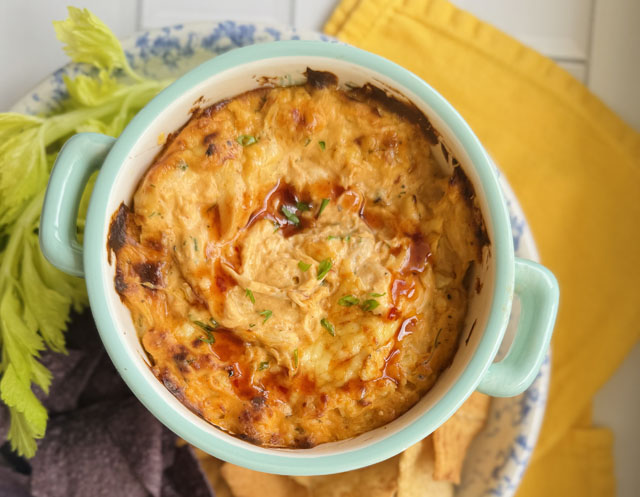Haute Cuisine
04 Apr 2024
Roots & Vine offers an experience like no other
By KAY WEST
Photos by CAROLE SHEPARDSON
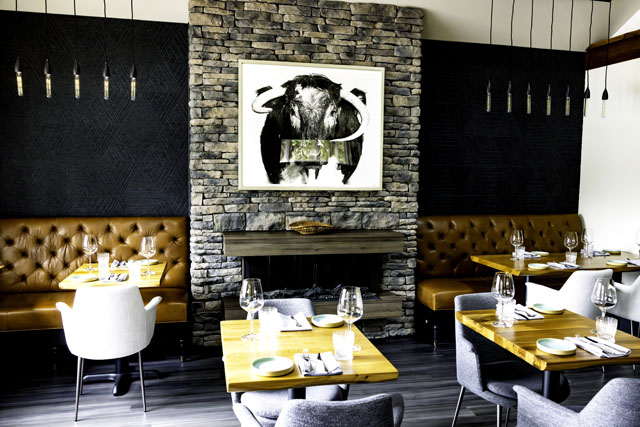
As the 2023 summer season was winding down in Highlands, and autumn awaited its turn, Curtis Higgins was preparing to open a restaurant and looking for the right chef. Kalen Fortuna was an experienced chef looking for the right restaurant that would allow him free rein of expression.
Fortuitously, the stars aligned to bring the seekers together, and the glorious outcome is Roots & Vine, an elegant, intimate space with lofty aspirations, offering a dining experience unlike any other on the plateau.
Higgins – with decades under his own apron as a professional chef – originally intended the small building on a wooded corner lot to be Prime Highlands Steakhouse. That changed when he met Fortuna and his partner/sous chef Rose Rumpel.
Fortuna grew up on Isle of Pines and grew into being an executive chef at high-profile resorts and restaurants such as Little Palm Island off the Florida Keys and Peninsula Grill in Charleston. Taking a breather from large dining rooms, he was “hanging out” with his friend Cassidee Dabney, executive chef at Blackberry Farm, pondering his next move when he was alerted to an opportunity in Highlands. Despite having no interest in a steakhouse, he made the drive to meet Higgins at what was planned as a steakhouse.
“I had interviewed about 25 chefs, and none were right,” Higgins recalls. “When I met Kalen and Rose, it kind of clicked that we should do a tasting menu.”
It was a perfect match. “I wanted to team up with someone who wanted to offer the best in the area,” Fortuna says. “Who saw the value in extending hospitality beyond a meal to an experience.”
The steakhouse was chopped, and in its place a multi-course, prix fixe tasting menu culling the freshest ingredients from local producers was borne, offering unique items from Appalachia’s vast expanse with everything from vinegars to butter made in house.
Over the holidays, Fortuna and Rumpel suggested to Higgins a name change to better reflect what was coming out of the kitchen; in January, Roots & Vine made its debut.
The menu has also evolved since the opening and will continue to do so. “It’s kind of a living concept,” explains Fortuna. “We eased into it when we opened, aware that the idea of a no-choices menu might not work right off the bat. We introduced a tasting menu with four of the six courses having options.”
Because the product is sourced seasonally, dishes will change frequently, month to month, or week to week should Fortuna and Rumpel perfect an idea they’ve worked on and feel it’s ready for its reveal. The winter 2024 menu will be far different than the opening winter 2023 menu; Fortuna is actively developing relationships with local farmers and fishermen, and the Roots & Vine pantry will be stocked with items from spring, summer and fall harvests Fortuna preserves, pickles or cures.
Fortuna credits his maternal grandmother in Appalachian Ohio and Kentucky with demonstrating those techniques and values, as well as the cast iron skillet he uses to sear WNC-sourced Wagyu striploin that is the luscious segue from entrée to dessert.
The bread course would be right at home on any southern table, albeit more sophisticated than country ham and biscuits. Airy yeast rolls are tucked into a linen napkin, golden tops glistening with salted honey, the perch for sliced Lady Edison Ham. A seashell is a whimsical ramekin for cultured butter made in house, centered with blackberry chutney, sprinkled with toasted sunflower seed crumble.
The first course will likely be chilled – in March one option was beet salad with smoked Kentucky bleu cheese, Cara Cara orange and candied pecans.
Fortuna calls the North Carolina yellowfin tuna dish a tribute to his paternal grandmother, a Lebanese immigrant who had a restaurant in Detroit for 20 years. Helping in that kitchen, he discovered his calling. “I grew up eating my grandmother’s kibbeh,” he says. “In Lebanon it’s a raw lamb dish, but because I grew up on the water and lived in Key West, I like to experiment with seafood.”
The tuna is dry aged on site, cubed and tossed in a sauce with flavor profiles of cinnamon and all-spice, resting on a mound of labneh (Lebanese yogurt) in a puddle of chive oil. Marcona almonds add crunch and clusters of tiny white pearls are likely everyone’s introduction to eggs harvested from snails raised in the mountains of New York state. Unlike traditional caviar’s hint of ocean, the taste is of moss and pine.
Katahdin lamb raised in Eastern Pennsylvania lands in a subsequent course, in two forms – sausage with Lebanese seasoning piped into a slice of sirloin, rolled in a collard leaf, wrapped in caul, sous vid, seared, cut into discs, topped with an heirloom carrot emulsion.
Memories of childhood trips to the mall with his mom are behind Fortuna’s Orange Julius-inspired dessert of Cara Cara panna cotta layered in a mold with Grand Marnier coulis, toasted vanilla and orange ice cream, crowned with a delicate tuille cookie.
Décor in the main dining room and windowed side room is minimalist – reflecting Curtis and Julie Higgins’ personal taste – providing a pristine canvas for the main show; buttery leather banquettes and upholstered, modern armchairs comfortably seat a maximum of 45 diners.
“We’re not for everyone,” says Higgins. “We’re not big enough to be for everyone. We are for people looking for an experience they can’t get anywhere else. Our goal is to be the best restaurant in North Carolina.”

